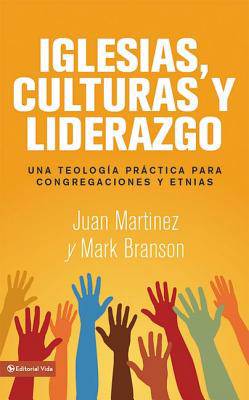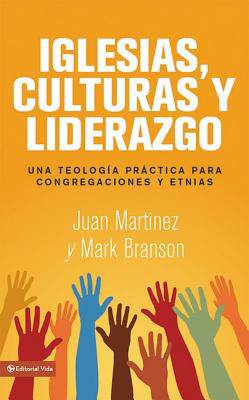
- Retrait gratuit dans votre magasin Club
- 7.000.000 titres dans notre catalogue
- Payer en toute sécurité
- Toujours un magasin près de chez vous
- Retrait gratuit dans votre magasin Club
- 7.000.0000 titres dans notre catalogue
- Payer en toute sécurité
- Toujours un magasin près de chez vous
Iglesias, culturas y liderazgo
Una teología práctica para congregaciones y etnias
Juan F Martínez, Mark Lau BransonDescription
En Iglesias, culturas y liderazgo: Una teología práctica para congregaciones y etnias, los autores buscan fomentar la atención hacia la vida intercultural que se está desarrollando en cada iglesia y también en las relaciones entre las diferentes iglesias y sus entornos. Los autores Juan Martínez y Mark Bransoncreen que la presencia del reino de Dios en la tierra, inaugurado en la vida, muerte y resurrección de Cristo, es una presencia que se debe caracterizar por un ministerio de reconciliación. ¿Qué hace falta para dirigir iglesias multiculturales? Moisés salió de Egipto con una «multitud mixta», y los primeros seguidores de Jesús tuvieron que aprender que el Espíritu Santo los estaba llevando a cruzar los límites entre las distintas culturas de su tiempo. Vivimos en un mundo que es culturalmente diverso, y casi todas nuestras ciudades y nuestros vecindarios son testigos de esa diversidad. Esto se hace evidente en los medios de comunicación, en los centros comerciales y en las escuelas; y aunque poco menos evidente en las iglesias, va también en aumento. Ese es el motivo que los llevó a escribirlo: animar a los líderes de las iglesias en la creación de ambientes que hagan evidentes las iniciativas de reconciliación en la vida interna de las iglesias, y en nuestra labor misionera dentro de nuestros vecindarios y ciudades. Este libro contiene:
- Información relevante sobre el contexto multicultural en el que vivimos.
- Información sobre las distintas perspectivas socioculturales.
- Herramientas prácticas para el liderazgo y la comunicación efectiva.
Churches, Cultures and Leadership
In Churches, Cultures, and Leadership: A Practical Theology of Congregations and Ethnicities, the authors seek to foster the intercultural life that is developing in each church and also in the relationships between different churches and their environments. Authors Juan Martínez and Mark Branson believe that the presence of the kingdom of God on earth, inaugurated in the life, death, and resurrection of Christ, is a presence that should be characterized by a ministry of reconciliation. What does it take to lead multicultural churches? Moses left Egypt with a "mixed crowd," and the early followers of Jesus had to learn that the Holy Spirit was leading them to cross the boundaries between the different cultures of their time. We live in a world that is culturally diverse, and almost all of our cities and neighborhoods bear witness to that diversity. This is evident in the media, in shopping malls, and in schools; and although slightly less evident in the churches, it is also increasing. That is why they wrote this book: to encourage church leaders to create environments that make reconciliation initiatives evident in the inner life of churches, and in our missionary work within our neighborhoods and cities. This book contains:
- Relevant information about the multicultural context in which we live.
- Information on the different sociocultural perspectives.
- Practical tools for effective leadership and communication.
Spécifications
Parties prenantes
- Auteur(s) :
- Editeur:
Contenu
- Nombre de pages :
- 304
- Langue:
- Espagnol
Caractéristiques
- EAN:
- 9780829760958
- Date de parution :
- 05-02-13
- Format:
- Livre broché
- Format numérique:
- Trade paperback (VS)
- Dimensions :
- 152 mm x 226 mm
- Poids :
- 362 g

Les avis
Nous publions uniquement les avis qui respectent les conditions requises. Consultez nos conditions pour les avis.






